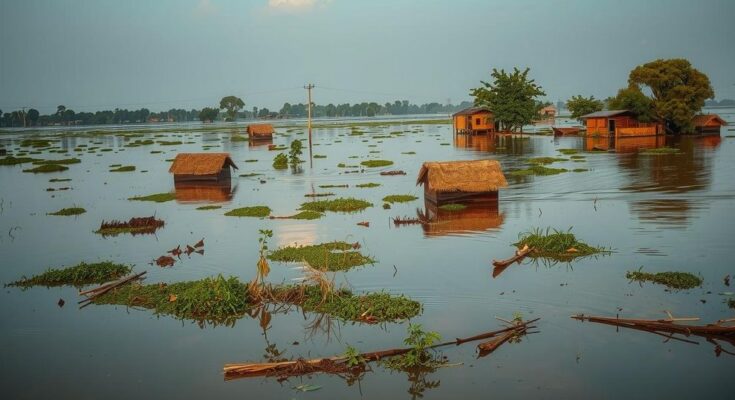Devastating floods in South Sudan have impacted over one million people, displacing approximately 271,000 individuals. The UN forecasts suggest that the situation may worsen, potentially affecting up to 3.3 million people due to unprecedented rain and flooding. Access to essential supplies remains restricted, exacerbating food insecurity in the region, identified as a global hunger hotspot.
Recent heavy rains in South Sudan have resulted in catastrophic flooding that has affected over one million individuals. According to the UN Office for the Coordination of Humanitarian Affairs (OCHA), released on Friday evening in Juba, the capital, around 271,000 people have been displaced across 42 of the nation’s 78 counties. The report highlighted that Northern Bahr el Ghazal and Unity states comprise approximately 40 percent of the affected population. There are alarming forecasts from OCHA suggesting that the unprecedented floods could impact up to 3.3 million people from September to December. Additionally, the flooding and consequent heavy rainfall have made 15 critical supply routes impassable, significantly restricting access to various regions. South Sudan is grappling with an exceptional level of flooding, with predictions indicating above-average rainfall, riverine flow from Uganda, and potentially historic flood levels. The country has been categorized as one of the 18 hunger hotspots globally, where food security continues to decline, as per UN assessments.
This article discusses the significant humanitarian crisis stemming from severe flooding in South Sudan, particularly in the wake of continuous heavy rains. The situation is exacerbated by existing food insecurity in the region, necessitating urgent humanitarian interventions. The data provided by OCHA underscores the widespread impact of the flooding, highlighting the need for both immediate relief and longer-term strategies to address the underlying vulnerabilities contributing to such disasters.
In summary, the unprecedented flooding in South Sudan has led to significant displacement and a looming humanitarian disaster affecting over one million people, with concerns that the number may rise. The inability to access critical supply routes further complicates the situation, heightened by the ongoing food insecurity challenges in the country, which is already marked as a hunger hotspot. There is an urgent need for coordinated humanitarian responses to alleviate the suffering of the affected populations.
Original Source: www.thehansindia.com




